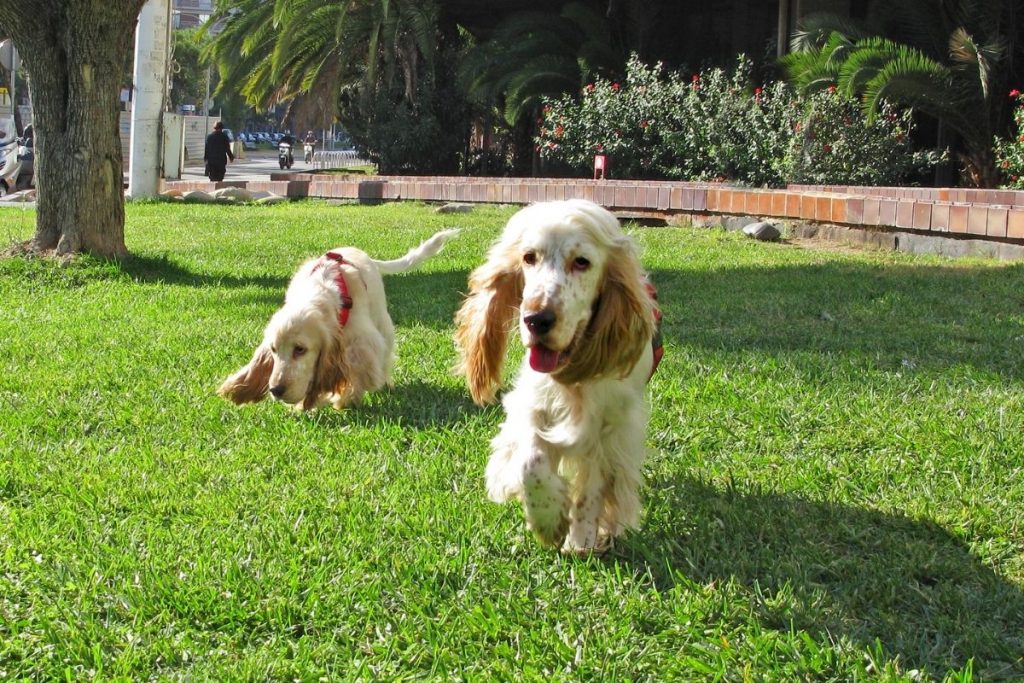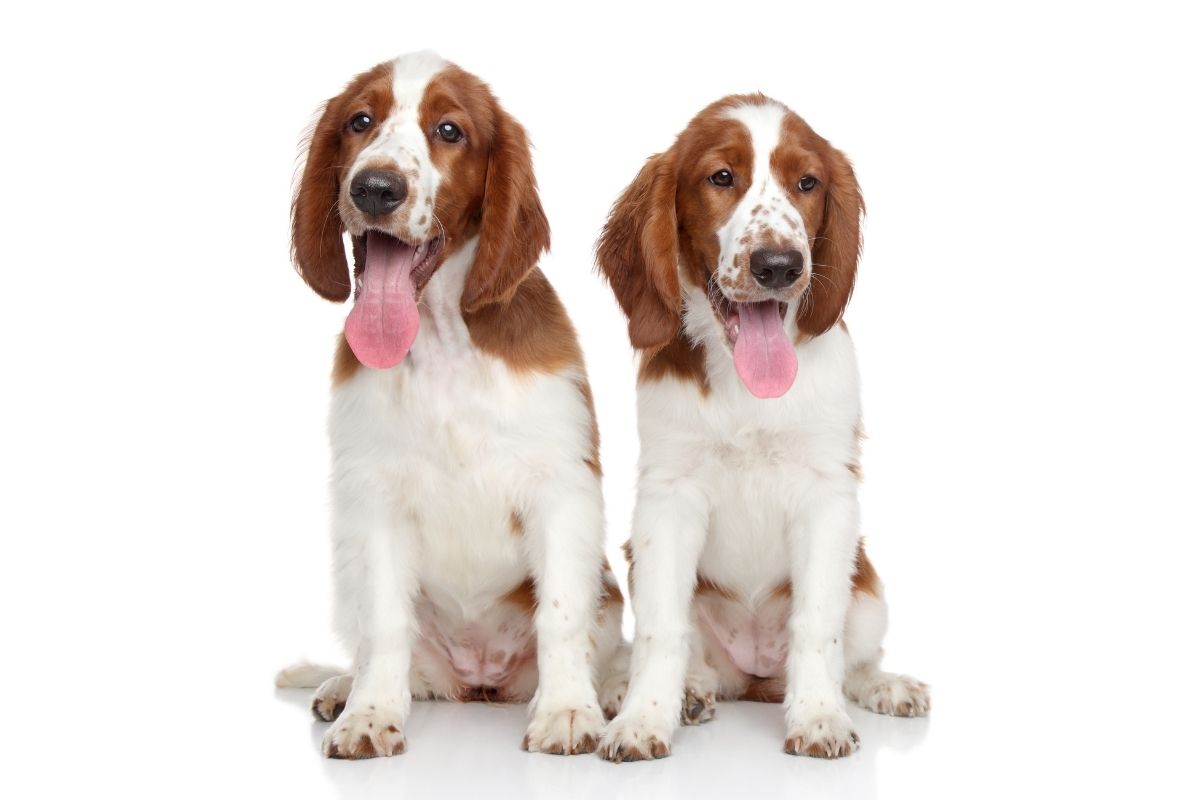If you already have a dog or dogs then it’s possible that you may, at some point, decide to get a puppy to join the pack and, for the uninitiated, this can present some potential problems with the established ‘pack’.
With a little care and by simply thinking ‘dog’ you can minimise the risks associated with bringing a young puppy into your older dog’s home.
The simplest and most straightforward way of introducing a puppy to older dogs is to allow the dogs to meet in the home under supervision. Most adult dogs will tolerate puppies and, as long as the older dogs have a place where they can go to be away from the puppy and, that their routine is maintained, you will reduce any potential risks to almost zero.
How to introduce a puppy to an older dog
It’s important to prepare before your puppy comes home.
Make sure that you have an area where your puppy can sleep quietly and safely.
I use a simple dog crate for this, making it comfortable for the puppy so that she/he comes to understand that this is their home and safe place.
Note that I do not use crates or cages for ‘house training‘. This is something that I will never, ever recommend to any puppy or dog owner and I urge you to resist the people that say a cage should be used for this purpose.
Trust me when I say this that anyone who suggests that you use crates for housetraining know nothing about training dogs or caring for puppies.
You will need to make sure that you have food for your puppy and that the pup has their own water and food dishes too.
[amazon box=”B097RJVLY9″ template=”horizontal” title=” Puppy Pen with Removable Floor” description=”Having a safe place for your puppy is important. It allows him to be comfortable and feel secure. Look for one that is easy to setup and that has a removable floor in case he has any accidents.”]
Bringing your puppy home
How you get your puppy will be dependant upon your circumstances but I’ve always found that collecting the puppy from the breeder, in the car, is the best option.
I’ll take the older dogs with me when I do this, keeping them in the rear of the estate car. This allows them to sniff the puppy, who travels home on the rear seat with a human chaperone.
This may seem like a small point but I’ve always found that this short period of time that allows the older dogs to smell the new arrival, helps.
The puppy’s arrival at home
You will need to supervise things with the dogs when the puppy gets home, remembering that puppies are small and fragile babies that need looking after.
Within the last 24 hours, we’ve added a new puppy to our pack and the way that we introduced her to the older dogs followed the collection process above.
Once we arrived home the older dogs were allowed into the house first while the puppy was carried inside and then placed down and introduced to the others.
A few sniffs later and you’ll find that most dogs are accepting of puppies and they will all soon settle down into life together.

Maintain the routine of the older dogs
It’s important that you maintain the daily routine of the older dogs in terms of feeding, walking, training and any other activities that you undertake with them.
When a new puppy arrives you will have extra commitments dog care wise but it is important that the older dogs do not become neglected or forgotten about.
Don’t ignore the older dogs
It is very tempting to cuddle, fuss and play with a new puppy – and these are all good things to do. They help the puppy to settle into their new home and to get to know their new family.
These things also develop the puppy’s social skills and mental abilities and playtime at an early age really helps to develop the puppy’s confidence.
It’s important to maintain the levels of contact with your older dogs and to spend time with them too – if you spend too much time with the puppy and not enough with the ‘elders’ then, without realising it, you could introduce some jealousies and create some canine displeasure towards the youngster.
Allow the dogs to sort themselves out
Dogs have a hierarchy and you’ll need to be aware of the need for the pack to maintain this.
Adult dogs tend not to be aggressive towards puppies and most admonishments with be a curl of the lip ( to show teeth ) or a growl to ward off an overly adventurous puppy.
It’s rare for things to go beyond this ( although you may see an adult dog snap at a puppy if it’s brave enough to ignore the warnings ).
Unlike many modern children, puppies are normally very respectful of older dogs and, provided that you supervise properly, then you shouldn’t experience any problems with violence.
How long does it take an older dog to accept a new puppy?
This, like many other things to do with dogs, varies quite considerably depending upon the breeder and the age at which you get your puppy.
Ideally it shouldn’t be too long ( a week or two at most ) but you will want to make allowances for the older dog’s personality and temperament too. If an older dog is a little more stand-offish then this will take a little longer.
In essence, a new pup can be integrated into an existing family without much in the way of problems providing that you have a reasonable pack structure to begin with.
The real key is in your supervision and, when required, discipline.
Your older dog may not want to play with the puppy and the puppy should respect his wishes to be left alone – the older dog should have somewhere where he can go that the puppy cannot access – beds are normally a good bet as puppies can’t jump onto them.
The important thing is to not get stressed about the amount of time it is taking, if you are worked up then the dogs will know and you’ll just make matters worse.
Some dogs just take longer than others to adapt to changes and a new puppy is a big change – keep the stress levels to a minimum and maintain the routine.
Your dogs will soon settle down.
Final Words
Your new puppy doesn’t have to be the centre of attention all the time. Make sure that you spend enough time with your older dogs to maintain their routine.
They should soon accept the pup into the pack and it shouldn’t take too long before all is calm in your canine household.
Read Next
- When Do Puppies Stop Growing?
- What temperature do newborn puppies need? What you need to know
- What Age Can Puppies Have Raw Food?
- Top tips for finding a good dog breeder
- The Ultimate Guide to Feeding Your Puppy: Best Foods, Diets, and More
- The Top Things to Teach Your New Puppy for a Well-Behaved Companion










